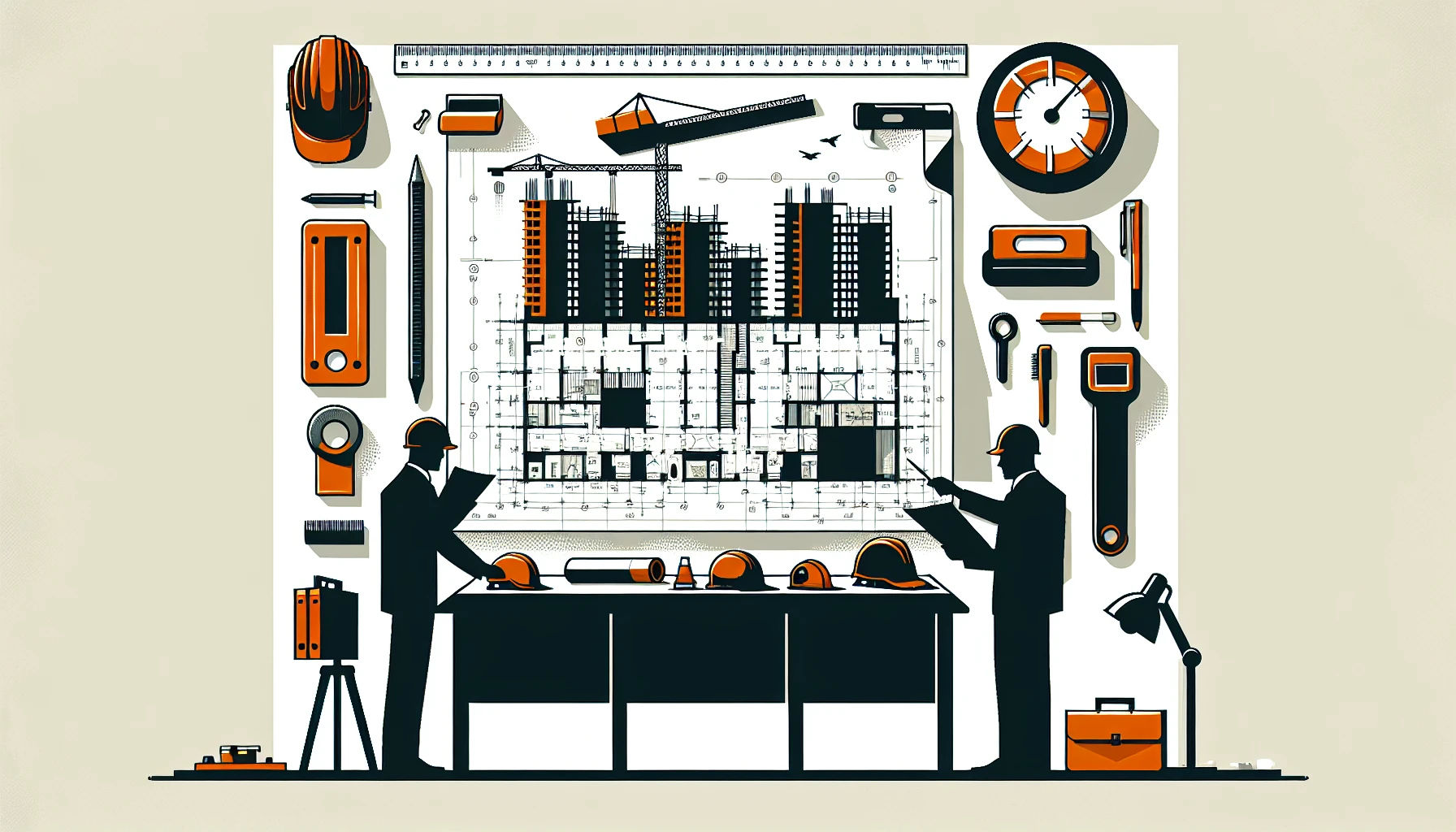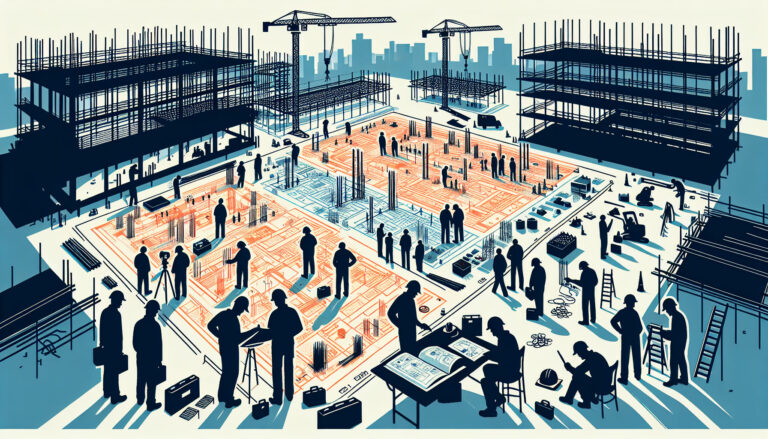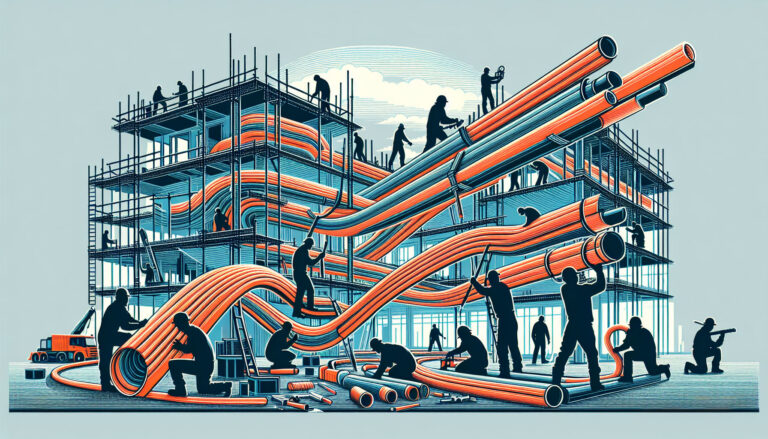In the world of hard hats and blueprints, a seismic shift is underway in construction engineering and project management. This isn’t just jargon; we’re talking about a real game-changer here. Projects are getting more complex, and knowing your stuff in both fields is now a non-negotiable to keep up. Construction engineering and project management are the twin forces driving this shift.
Here’s the deal: construction engineering is all about getting things built—planning the work and managing the nuts and bolts. While project management is the art of leading a project from the first sketch to the final brick, nailing the trifecta of time, budget, and quality.
Up Next: Navigating Construction’s New Terrain
Building sites are full of challenges like nail-biting deadlines and money headaches. We’re about to dive into some no-nonsense strategies that’ll help you crush these obstacles. So buckle up, because you’re going to learn how to streamline your projects and maybe even your career.
With a whopping 83% of engineering and construction companies not fully on board with digital transformation according to some stats, there’s a huge opportunity for you to leap ahead. Stick around, and you’ll walk away with some solid tactics to make sure you’re not just surviving but thriving in construction and project management.
Construction Management vs. Engineering Management
Construction management and engineering management are two different animals. They might work towards the same end goal, but they sure don’t use the same playbook. Let’s break down the differences.
What is Construction Management?
Construction management is the hands-on part of the building process. Think of a construction manager as the maestro of a construction site orchestra, making sure each section hits the right notes at the right time. Responsibilities include:
- Overseeing the entire building process
- Keeping a tight leash on budget, deadlines, and quality
- Enforcing safety standards like a boss
What is Engineering Management?
Engineering management? That’s the brainy part, focusing on drafting the master plan. It’s all about diving into the details to make sure the structure stands strong. Engineering managers deal with:
- Creating practical and actionable designs
- Applying technical knowledge to tackle tough problems
- Pioneering with materials and construction methods
Comparing Responsibilities
Here’s the lowdown: construction managers own the project management responsibilities, keeping the gears turning smoothly on site. They’re the point person for execution. Engineering managers, wielding their engineering expertise, make sure the project’s bones are unbreakable, ready for any tantrums thrown by Mother Nature.
While construction managers are orchestrating the day-to-day, engineering managers are immersed in design and analysis. This teamwork prevents projects from descending into anarchy.
Now, about tech’s role in all this. Say you’re using SmartBarrel’s portable timeclocks (Portable Timeclock for Construction). These devices streamline the daily grind for construction managers by making time tracking a breeze, no PhD required. And for engineering managers, it means more accurate data for those all-important calculations.
Educational Pathways in Construction Engineering and Project Management
Let’s cut to the chase: if you’re gunning for success in construction engineering and project management, you need the right education under your belt. We’re talking about a solid foundation through degrees that target the construction industry’s needs.
Degree Specializations
Picking the right specialization can set you up for the big leagues. From structural engineering to sustainable design, these focused paths equip you with the skills for:
- Construction technology and innovation
- Project finance and cost management
- Risk management and mitigation strategies
Choosing the right program is crucial—your future self will thank you. And here’s something to chew on: snagging a specialized degree could mean a bump in your paycheck. For instance, construction managers with a master’s degree can see an average salary increase—up to $121,224 according to Salary.com.
Curriculum Insights
We’re talking turkey now: the curriculum in these programs is no fluff zone. They cover the heavy-hitters, from industry-specific coursework like construction methods to the leadership chops you’ll need to steer the ship and not hit an iceberg.
- Industry curriculum such as construction methods, materials, and contracts
- Leadership skills for managing teams and clients
- Advanced problem-solving for those inevitable surprises
This mix of theory and hands-on skills is what’ll turn you from a rookie to a pro who can tackle construction’s toughest puzzles.
Time Commitment for Degrees
Here’s the deal: getting a degree in construction engineering and project management is tough but worth it. Whether it’s a two-year, four-year, or a master’s program, you’re looking at some serious time and effort. Keep in mind, the construction industry waits for no one. If you’re already working, part-time or online programs can be a lifesaver.
Why bother? Because a degree isn’t just a piece of paper. It’s proof you’ve got the knowledge and the guts to stick it out, which can fast-track your career progression. Plus, it’s your ticket to the latest industry knowledge, like the nifty tricks you’ll find in SmartBarrel’s Daily Log App—a tool that’s changing the game by making daily reporting a breeze.
Sustainability priorities in US construction and engineering firms, 2022
And if you ever wonder whether all this learning about sustainability and energy efficiency is worth it, just look at this chart. It’s clear that firms are prioritizing greener practices, and with the right education, you can be at the forefront of this shift.
Project Management Skills in Construction and Engineering
Education is crucial, but in the world of construction engineering and project management, it’s the real-world skills that make you stand out. We’re talking about project management—essential for keeping your projects from turning into money pits.
A. Importance of Project Management
Without sharp project management skills, even the best-engineered project can tank—hard. It’s all about juggling resources, deadlines, and teams to nail those goals and keep everything from going south.
- Keeps projects on track and within budget
- Ensures compliance with safety and quality standards
- Manages communication across all stakeholders
Think of project management as the superglue for your project’s many elements. And when the pressure’s on, it’s this superglue that keeps the chaos at bay.
B. Project Management Techniques
Crafting the right approach is key. Agile, Lean, and Six Sigma are some heavy hitters that successful managers use to stay on top of their game. Whether you’re tweaking schedules or streamlining construction techniques, these strategies could be your ticket to the big leagues. And with advanced degrees often leading to fatter paychecks, it’s worth considering leveling up. A master’s degree could mean seeing a salary bump—no chump change here.
Tool up with tech like SmartBarrel’s construction time tracking software, which streamlines your workflow by automating the grunt work. This lets you zoom in on the critical aspects of construction engineering and project management, giving you more time to focus on what you do best.
Industry Applications and Emerging Occupations
The expertise in construction engineering and project management is essential across various sectors. It’s shaping how we tackle projects from infrastructure to energy, finding smarter ways to hammer out progress.
A. Industry Applications
Looking beyond construction sites, industries like transportation and energy are all harnessing these skills. A case in point: the high-speed rail projects that demand meticulous planning and sharp execution, where this expertise is invaluable.
- Transportation projects, like high-speed rail systems, need precise planning and execution
- Urban initiatives that aim for both sustainability and efficiency
- Renewable energy projects that require a tight blend of engineering and project management
This expertise is crucial for tackling complex, interdisciplinary projects that shape our environment.
B. Emerging Occupations
As technology advances, so does the job market. The Bureau of Labor Statistics expects construction management jobs to grow faster than average in the next decade. This growth is spawning new roles like:
- Sustainability coordinators ensuring green practices in construction
- Data analysts optimizing project delivery through number crunching
- Drone operators providing aerial insights for better project monitoring
These new gigs show the industry’s lean towards innovation and efficiency, powered by tech and a drive to do more with less.
Tools like SmartBarrel’s construction manpower tracking system are defining examples of tech integration that align with these emerging roles, offering real-time labor data that aids decision-making on the fly.
Leadership and Management Skills in Construction Engineering
To nail it in construction engineering and project management, you’ve got to run a tight ship. Leadership is about inspiring action, no fluff. It’s about being the boss everyone trusts to steer the ship away from disaster.
Essential Leadership Qualities
Great leaders in construction engineering aren’t just bossy—they’re the ones with guts, honesty, and big-picture thinking:
- Decisiveness, because hesitating is not an option with tight deadlines
- Integrity, ensuring your team trusts you as much as the buildings you erect
- Vision, to innovate beyond the day’s blueprints
These leadership qualities are the difference between a sinking project and a lucrative venture.
Soft Skills: Communication, Negotiation, and Team Management
Soft skills are what keep the gears turning. You might be a wizard at blueprints, but without the ability to chat up your team, strike deals, or juggle different personalities, you’re not playing the full game.
- Communication means clear instructions that won’t get muddled from the office to the field
- Negotiation skills for scoring deals that keep the ledger in the black
- Team management is about balancing the mix of talents and egos to keep the workflow smooth
Lack these skills, and you’re in for a bumpy ride. Master them, and you’re looking at a well-oiled machine.
Take SmartBarrel’s Construction Safety Tracking—it’s a prime example of tech meeting leadership. It’s not just a fancy gadget; it reflects the foresight to put worker safety first, proving leadership chops while keeping up with tech.
Legal Framework and Financial Planning in Construction Projects
Jumping from leadership to the nitty-gritty of legal and financial management in construction engineering and project management, let’s get real about the stuff that keeps your project in the clear and your budget on track.
Legal Framework
Legal snafus in construction? Big trouble. You’ve got to handle this stuff:
- Contracts are your project’s playbook—miss a detail, and you’re offside.
- Construction compliance isn’t just red tape. Screw it up, and you’re bleeding cash in fines.
- Zoning laws and building codes—know ’em or risk watching your project crumble.
Miss an “i” or a “t” here and watch your project spiral. No joke.
Financial Planning and Analysis
Talking dollars and cents, budgets can blow up without a tight plan. Here’s the drill:
- Budgeting is more than penny-pinching; it’s about nailing forecasts and locking down the cash you need.
- Cost control means tracking every dime so it doesn’t slip through your fingers.
- Financial calls? Make ’em smart or watch your project’s wallet get skinny.
This part of project management might not get your heart racing, but it’s what fills the bank and keeps crews cranking. And hey, tools like SmartBarrel’s Construction Cost/Productivity Tracking are game-changers, making it simpler to stick to your financial game plan without losing your mind.
As you lead teams and break new ground, remember: solid legal and financial groundwork is what makes a project rock-solid.
Technological Impact: BIM and Construction Innovation
The construction industry is not just catching up with the digital revolution; it’s fully enrolled. Technology is reshaping construction engineering and project management, making it more efficient than you can imagine.
Building Information Modeling (BIM)
BIM is revolutionizing construction. It’s not about drawing; it’s about creating a digital twin of your project that everyone can see and use. It makes workflows smooth, everyone stays on the same page, and it can even predict problems before they happen. Let’s get real here: a hospital project in Wisconsin used BIM to coordinate between multiple teams. The result? They cut down on wasted materials and finished three weeks ahead of schedule. That’s the BIM difference.
Construction Technology Trends
Now, let’s break down the new tech hitting the site. First off, we’ve got wearables keeping tabs on worker safety and health. Then there’s the cool autonomous tech like drones and self-driving trucks, doing site scans and moving stuff around without a human in sight.
And get this: 3D printing is changing the game in design and materials. These aren’t just shiny new toys; they’re tools that can put you ahead of the curve, provided you know how to use them.
Speaking of tools, something like SmartBarrel’s Construction Site Access Control is a no-brainer. It’s like having a bouncer for your site who’s also an ace bookkeeper. It keeps your site secure and tracks your crew’s comings and goings, meshing seamlessly with BIM’s digital approach.
Bottom line: Using tech in construction engineering and project management isn’t just for show. It’s what keeps you in the game. Innovate or get left in the dust.
Career Advancement: Opportunities and Salary Expectations
Mastering construction engineering and project management is one thing; climbing the career ladder is another. It’s about more responsibility and bigger paychecks.
A. Career Pathways
The industry’s ripe with growth opportunities:
- Project coordinators become project managers
- Site supervisors rise to construction managers
- Sustainability and BIM tech experts take on leadership roles
Each step up means more complexity and more cash. Every rung counts.
B. Salary Expectations
A fatter wallet’s great, right? Advanced education can bump up your earnings. A master’s degree could mean an increase from an average salary of $119,810 to $121,224 for construction managers (source).
Invest in your skills, and not only could you earn more, but you’ll also be the one keeping projects from blowing the budget.
And for specialty subcontractors, SmartBarrel’s subcontractor time tracking tools help you focus on career growth and your bottom line.
Take Action: Your Construction Engineering and Project Management Game Plan
In the ever-evolving world of construction, mastering construction engineering and project management is not just a perk—it’s your lifeline. It’s about getting ahead and staying there. So, if you’re eager to keep up and stand out, it’s clear that these skills are non-negotiable.
From the nitty-gritty of technical know-how to the art of leading teams, you need a toolset that’s as dynamic as the industry itself. Enter technology—your secret weapon to nail efficiency and innovation. SmartBarrel’s tech, for instance, is a game-changer, making compliance a breeze and keeping your projects on track.
- Think about those projects hemorrhaging cash left and right. With the right management chops, you’re not just cutting costs; you’re safeguarding your bottom line.
- While the majority are slow on the digital uptake, you could be the trailblazer, grabbing opportunities to shape a smarter, safer future in construction.
Wrap it up, and what do you get? A crystal-clear path to boosting your career and project success. Marrying construction engineering and project management with tech-savviness is your ticket to the big leagues. You’ll tackle today’s challenges head-on and lead the charge into tomorrow’s construction landscape. The future’s for the builders, and now, that’s you.
Ready to revolutionize your construction projects with SmartBarrel’s solutions? They’re the bridge between the challenges we’ve laid out and the success you’re chasing. Let’s build that future.
Connect with SmartBarrel today and take control of your construction projects!















